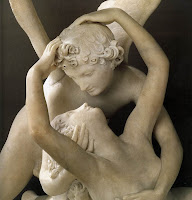
The reason the average discussion about anything goes nowhere is because everyone always talks about the thing at hand rather than the things assumed. What I mean is that we always discuss the "topics" but never our
assumptions that under-gird and give life to those topics. It's like having weeds in your garden and deciding whether to break out the weed-eater or pull them up by the roots. Most of us break out the weed-eater: it's easier, takes less time, makes a glorious racket, and is good for a laugh when the casual passerby is barraged with vegetative shrapnel.
Pulling up by the root takes too much work. It's a hands-on, dirty, intimate process. We have to get on our knees and take each weed one at a time, coming to grips with their unique shapes and challenges, finding the right amount of leverage to unseat them, and finding the right consolation when we fail to yank the suckers fully free from the earth. It's all too messy and involved, but we'll never really take care of the weeds if we don't deal with the roots. That's what's wrong with the majority of our so-called "discussions" or "conversations": we're all whacking each other with weed-eaters, while the roots remain untouched.
Take any "hot-button" issue and you'll see what I mean, like gay marriage for example. Everyone makes everything and anything out of it: it's about the degradation of culture, or equal rights for equal people, or legislating morality, or protecting our children, or protecting our liberty, or freedom of conscience, or love, or hate, or whatever additional buzzwords are floating about, clouding up the debate like a pack of flies. The truth is that gay marriage is about
none of those things. Those things are a part of it, they spring naturally from it, but they're not what it's
about, what it's fundamentally built on. And what it's fundamentally built on is whether or not there
is anything "fundamental" at all.
Is gender a fundamental reality or an arbitrary construction? Is there a fundamental reality out there? How can we know? To what authority do we reference? Is there such an authority? How do we know it/them/him/her? These are the questions that gay marriage is really asking. These are the presuppositions that inform the debate. These are the roots. Gay marriage is not about whether morality is on the decline; it's about whether or not objective meaning is an illusion we've created. It's not about whether we should let inequality exist; it's about whether or not nihilism is true.
 |
| Subjectivist? Nay! Subject-abyss. |
If you are pro-gay marriage, then at bottom you hold that (at the very least) gender and marriage are empty concepts, and the only authority to say what they are is the subject(s) participating in it. You may not put it in those exact words, but that's exactly what a presupposition is, i.e., pre-supposed, assumed before any words. You assume gender and marriage under an individualistic, subjectivist, nihilist framework and let the rest roll from there. Likewise, if you are anti-gay marriage, then at bottom you hold that (at the very least) gender and marriage are not empty concepts, that they have fundamental, essential realities, and that conformity to those realities is the only way to truly live and enjoy them. Again, you may not have put as much into words, and you may not even be sure what authority gave those concepts their essential reality and meaning, but you hold to the existence of those realities (and authority) nonetheless.
Every topic or "hot-button" issue has their roots somewhere, and the only real way to have a real debate about these things (and not simply a shouting match or a group hug) is to deal with the roots. If you want to discuss gay marriage, then don't start with the shrubbery of equality or morality. Start with the roots of authority and reality: is there an objective reality to things, and is there an authority that tells us what that reality is and is not? Until that debate happens, everything else is so much window-dressing in a never-ending flame war.
 |
| By Jove, it's all linked! |
I have found this to be true in my own discussion or engagement with certain topics and issues. I find a strange collaboration amongst things that seem at first to be disparate from each other. Somehow, a collection of unrelated items was all along involved in a conspiracy within me. I found to my shock that all my separate shrubs belonged to the same root system. For example: gun-ownership, the death penalty, and Hell are all things I have opinions on, things that everyone has some kind of opinion on. The thing is, I thought that they were each (by themselves) an issue unto itself, when in fact they all belonged to the same source. They all rested on the same fundamental assumptions.
Those assumptions had to do with evil. Your opinion on whether or not men and women should own a weapon, whether or not certain crimes are punishable by death, and whether or not a just and loving God would send/condemn/confine certain people to eternal punishment all stem from this one source, this one question: what is evil? What does it look like? How do we recognize it? And how ought we to respond to it? Believe it or not, your stance on self-defense, capital punishment, and eternal damnation all rest on this hinge: what is your "stance" on evil? What assumptions about it do you have?
 |
| "I find your lack of evil disturbing." |
Allow me to speak for myself in order to produce an example. Here is at least one thing I believe about evil: that it comes in many different shades and intensities,
including the darkest shades and worst intensities. I believe, in other words, that there is such a thing as irredeemable, irrevocable evil, of a place where a moral frontier has been crossed that cannot be uncrossed, where the downward spiral has reached terminal velocity and cannot be recalled. Not to be cliche or hang my laurels on a worn-out nail, but when
Alfred described the Joker as a man "who doesn't want anything logical," who "can't be bought, bullied, reasoned to, or negotiated with," and "just wants to watch the world burn," I
believe him. I believe he is absolutely right. There are such men (and women) out there, and they are not as rare as we suppose.
This is one of my assumptions about evil, and it is why I am in favor of gun-ownership and the death penalty, and why I believe in a place called Hell. Not because I necessarily "like" those things or are glad they exist, but because I know there are certain persons to whom there is no other solution or answer but an extreme one. There is no forgiveness or mercy or grace that will turn them, no therapy or accommodation or understanding that will change them, no compromise or appeasement that will stop them. A line has been crossed, and they will not turn back. What else is there that we can do to or for them? What else is there for even God to do? If they will not be forgiven, if they will not receive help, if they will not stop, then they must be stopped. I believe in such an evil as that, an evil in which our only legitimate response is to stop it by whatever means necessary.
This is one of the reasons I lose all patience with the anti-death penalty argument that says, "If we kill them then we are no different than them." The idea is completely absurd; the very reason we seek to put them to death is precisely because we
are "different" than them. We seek their death because we belong to a moral sphere; they sought death and destruction because they stepped out of and beyond all moral spheres. We want them dead because we care too much about the lives of others in our communities (and even our prisons); they wanted others dead and destroyed because they cared nothing about them at all. There is a
universe of difference between us and them, between the whole of common sense humanity and the occasional degenerates who seek our slaughter. If there truly was "no difference" between the two of us, then we wouldn't even be having this debate, for we wouldn't even call their actions wrong or punishable in the first place. The very idea of punishment can only come from a moral order and those who adhere to it. Thus, our similarity is merely superficial: the shrubs seemed identical, but their roots are miles away, in different depths and other soils.
Because I assume these things about evil, it not only shapes my own stance but also my thoughts on the stances of others. If someone is anti-gun ownership, anti-death penalty, anti-Hell, or (what is more often the case) all of the above, I find myself assuming (because of my presupposition) that they have an incorrect view of evil, that their view of evil is skewed, that it is somehow lesser or weaker than mine. Now, I may be right or wrong in having that assumption, and I may be being unfair to those who disagree with me, but for now it is what it is: the roots have affected the shrub and its relationship to other shrubs.
 |
| ...seems legit. |
The point of all this blather is this: any debate that does not deal with the fundamental assumptions that
under-gird our ideas will dissolve into shadow-boxing at best. I'm even
willing to bet that most of the stupidity and incivility that reeks
across our social and political realms like rot on a tree trunk could be avoided (for the
most part) if we would actually get to the
real point(s) behind our myriad "topics" and "issues" and "platforms," if we would get to the
real heart of the matter. There we find what is really at stake, what we really believe, and (perhaps more importantly) who we really are, for our beliefs spring from who we are. Like Jesus said, "Out of the heart" comes all that makes us who we are, for good or ill (Matt. 15:18-20), and we would do well to cease from squawking at each other and take some time to first look at our self square in the eye. Then, perhaps, we can look at others in the eye as well.
-Jon Vowell (c) 2013






























































